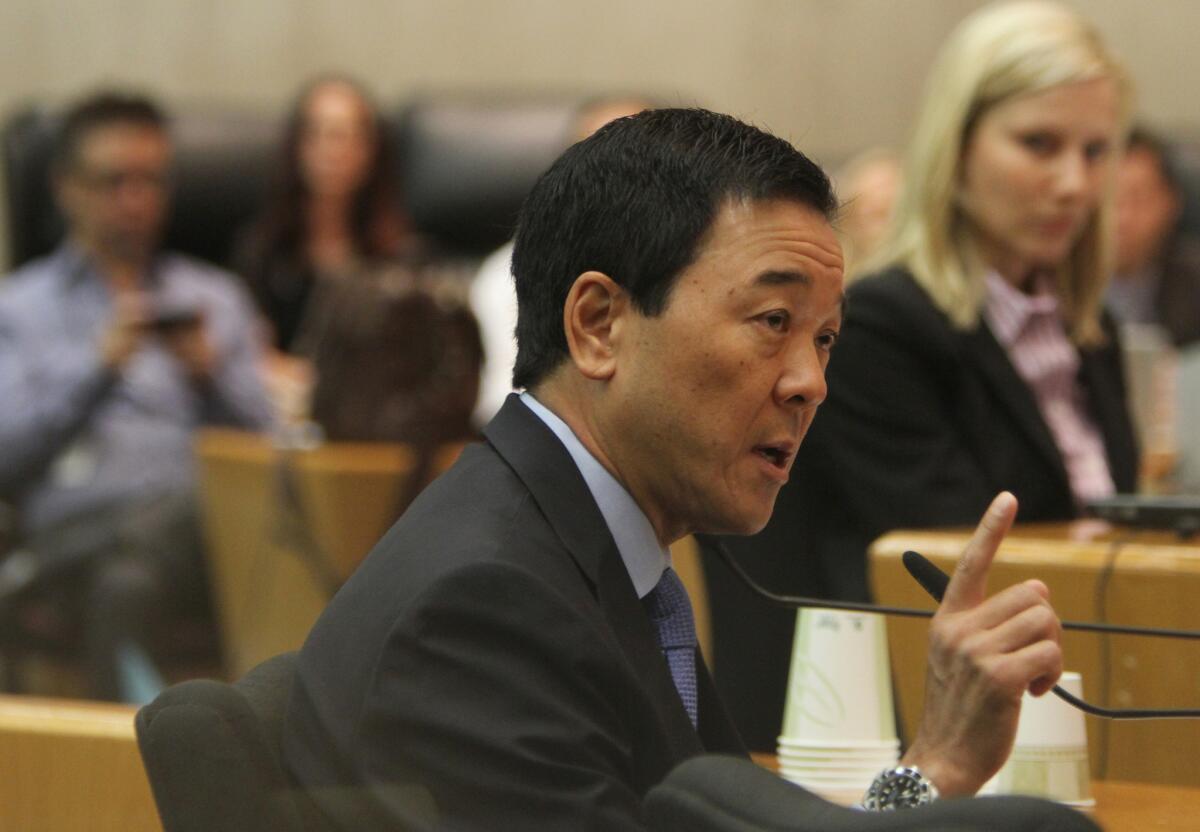Obstruction probe includes upper echelons of L.A. sheriff’s department

Former Undersheriff Paul Tanaka and a sheriff’s captain are being investigated for their alleged roles in hiding a jail inmate from federal authorities, a prosecutor revealed in court Monday.
Seven low-ranking Los Angeles County sheriff’s officials are being tried this month on federal obstruction-of-justice charges. The statements from the prosecutor at one of the trials are a sign that high-ranking supervisors remain under scrutiny.
Tanaka and Capt. William Carey were witnesses Monday in the trial of Deputy James Sexton. Under questioning from Assistant U.S. Atty. Brandon Fox, Tanaka said he is aware that he is a subject of an ongoing investigation.
Fox asked Tanaka if he knows that criminal cases sometimes start with lower-level officials before moving toward the top. Sexton’s attorney objected to the question, and the judge ordered it stricken from the record.
Tanaka, who is retired, is running for sheriff against six other candidates, with the primary election on June 3.
Tanaka and Carey are “subjects” rather than “targets” of the investigation.
But the line is blurry, with “subjects” sometimes becoming “targets” who are ultimately charged, said Laurie Levenson, a professor at Loyola Law School and a former federal prosecutor.
Fox’s wording indicates that the grand jury is still active and there could be more indictments coming, Levenson said.
Of the 21 sheriff’s officials facing federal criminal charges stemming from an investigation into the county jails, none is ranked higher than lieutenant. All but one have pleaded not guilty.
Sexton’s attorneys are using Tanaka’s testimony to argue that their client, who was 26 and three years out of the academy, was merely following orders from superiors.
Fox asked Tanaka if admitting that he obstructed justice would make him more likely to be criminally charged. Yes, Tanaka replied.
Tanaka also answered yes when Fox asked if admitting to obstruction would hurt his chances of being elected sheriff.
After discovering that an inmate had a cellphone provided by the FBI, sheriff’s officials gave the inmate various aliases in an attempt to hide him. The inmate, Anthony Brown, was helping the FBI investigate alleged brutality by deputies in the jails.
Lee Baca, who was sheriff at the time, said through a spokesman that he is not under federal investigation, to his knowledge.
In his testimony Monday, Tanaka often did not recall what he knew at each stage of Brown being moved around the jails. Fox showed Tanaka an email exchange about a directive requiring approval for all requests from other law enforcement agencies to interview inmates. Tanaka requested that neither he nor other sheriff’s executives be mentioned in the directive.
“You didn’t want your name on this policy, did you?” Fox asked.
“Uh… that’s what it looks like,” Tanaka said.
Fox challenged Tanaka’s testimony that Brown was moved only for safety reasons, noting that the inmate was initially allowed to remain at Men’s Central Jail under his own name. The aliases and the transfers began only after FBI agents came to interview Brown, Fox said.
Tanaka said he did not know that federal authorities were looking for Brown, and that he left the details of where Brown was housed up to his subordinates.
“We allowed that call to be made by the deputies,” he said.
“Is it your testimony that not one part of your intent was to clean your own house and make sure that the FBI wouldn’t be able to do it?” Fox asked.
“There was no intent there that we didn’t want them to clean our house,” Tanaka said.
Tanaka said he considered all the orders he and Baca gave to be lawful, and that he expected his subordinates to obey. Neither he nor Baca obstructed a federal investigation, he said.
At the time of the Brown incident, Carey was head of the department’s internal investigations bureau.
The bureau was investigating the deputy accused of smuggling the phone into the jails. Brown was moved around to keep him safe from other inmates who would have labeled him a snitch, as well as from deputies he was informing on, Carey said.
Carey said he believed both Tanaka and Baca had been briefed about the plan.
More to Read
Sign up for Essential California
The most important California stories and recommendations in your inbox every morning.
You may occasionally receive promotional content from the Los Angeles Times.











